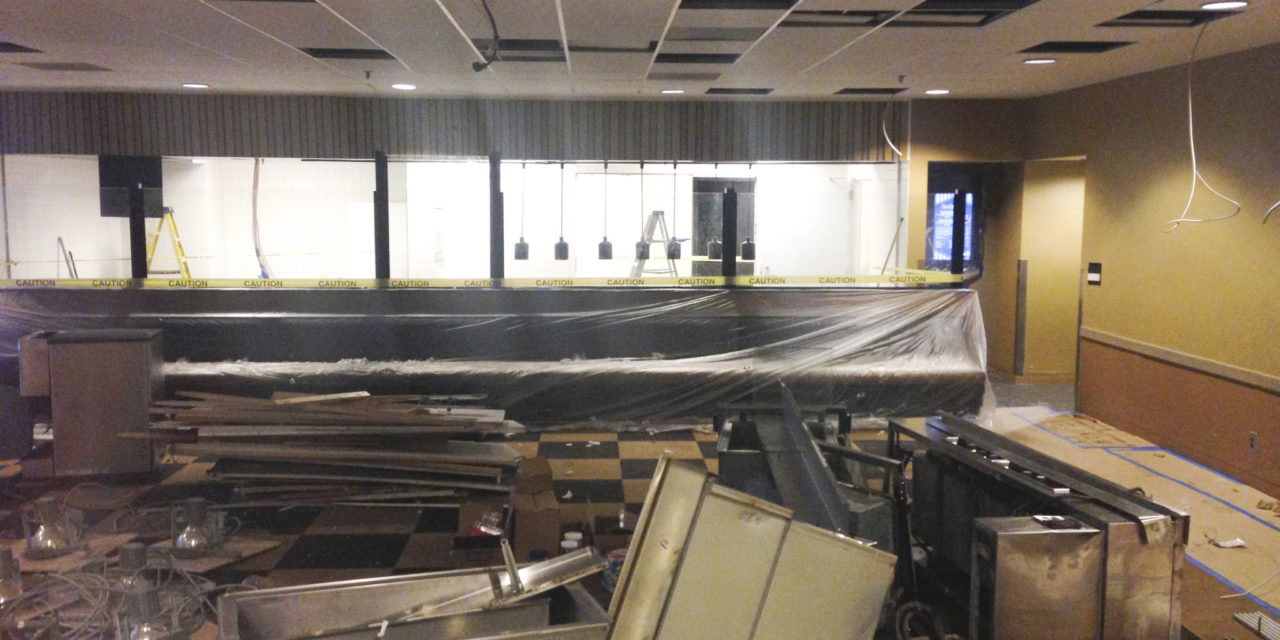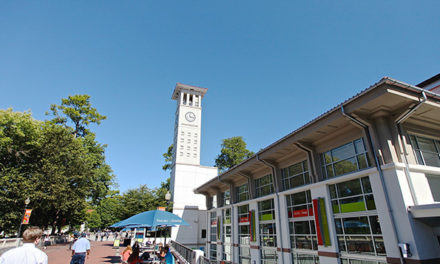In a little more than a month, the Faculty Dining Room will be transformed into a convenience store and deli catering to faculty, staff and students, according to Dave Furhman, the senior director of Emory Campus Dining.
The dining area, located across from the Mail Room on the first floor of the Dobbs University Center (DUC), closed for renovations on May 2 and will reopen on Oct. 15.
The new convenience store, Furhman said, will dwarf the convenience store at Cox Hall. Open from 8 a.m. to midnight every day, including on weekends, Eagle Convenience will resemble a 7-Eleven or Wawa-type mini-mart.
The deli, which Furhman compared to a Quizno’s or Subway restaurant, will serve Boar’s Head sandwiches every day from 11 a.m. to midnight.
“Our students have been very clear about wanting a dining option open on late nights and weekends,” Furhman said.
College sophomore Mackenzie Levy said the addition of the convenience store would save her the time it takes to walk to CVS for last-minute groceries and other items.
“Since I don’t have a lot of time between my classes, I think I’ll be using [the deli] a lot.”
College junior Aileen Rivell said she hopes the new dining area will mitigate the large crowds at Cox Hall and Dobbs Market during weekday lunch hours.
“I hate going to Cox at 1 [p.m.] – it is not a fun experience,” Rivell said. She added that the new dining area’s hours will help freshmen in need of a late-night snack or another option on weekends, when the DUC does not open until 10 a.m. and Cox Hall is closed.
Furhman also noted that the Faculty Dining Area’s location in the DUC made it the perfect place for such a project.
“It’s adjacent to our freshmen neighborhood, it’s right by the Woodruff Circle transportation center, it’s right across from the Woodruff P.E. Center – it’s central to campus life,” he said.
The University’s Campus Life Dining reserve funds paid for the new deli and convenience store, which Furhman said was low budget, though he declined to disclose the cost.
The project was designed so that the new refrigerators, shelves and other equipment can be packed up and reused, because a larger and separate Campus Life project to replace the DUC in the next few years is currently in the works, according to Furhman.
But until these renovations occur, the transformation of the faculty dining area should provide not just convenience and availability, but more inclusivity for students, according to Furhman.
He noted that the University’s Committee on Class and Labor recommended the construction of more student-inclusive space on campus in Jan. 2013.
On top of making the dining area student-inclusive, Furhman said Campus Dining is trying to encourage faculty to eat at the Dobbs Market, two floors above the once quiet and exclusive Faculty Dining Room. Though he said a relatively small number of faculty dined there prior to its closing in May, some faculty were disappointed.
Jasper Gaunt, an adjunct professor in Emory’s Art History department and the Greek and Roman Art exhibit curator at the Carlos Museum, counted himself among those disappointed faculty members.
Areas like the Faculty Dining Room “are wonderful places for faculty to talk shop, unwind between classes and bring distinguished visitors on campus,” Gaunt wrote in an email to the Wheel. “It was a unique venue in which to share information in a relaxed way, and it was a venue that fostered collegial friendship.”
Gaunt added that students should not have viewed the Faculty Dining Room as “exclusive” in the past, as faculty could invite students to dine with them, and that there was not “a pressing need” for a larger convenience store on campus.
Gaunt was not the only disappointed faculty member. Goodrich C. White Professor of Anthropology Peggy Barlett, who also dined with visiting speakers and her colleagues at the Faculty Dining Hall, said patrons there “really seemed to use it to build rapport within their departments.”
Though she conceded that another option was needed to lessen the crowds at Cox Hall and Dobbs Market during their busiest hours, she said she still laments the Faculty Dining Area’s removal.
“Ever since the café in the Carlos Museum closed, this was the only place to have a nice, professional lunch,” she said.
Furhman, however, said he sees the sacrifice as a necessary step up for student life.
“We understand their disappointment, yet we feel good about creating a space that will serve the entire campus community,” he said.
– By Lydia O’Neal
The Emory Wheel was founded in 1919 and is currently the only independent, student-run newspaper of Emory University. The Wheel publishes weekly on Wednesdays during the academic year, except during University holidays and scheduled publication intermissions.
The Wheel is financially and editorially independent from the University. All of its content is generated by the Wheel’s more than 100 student staff members and contributing writers, and its printing costs are covered by profits from self-generated advertising sales.





